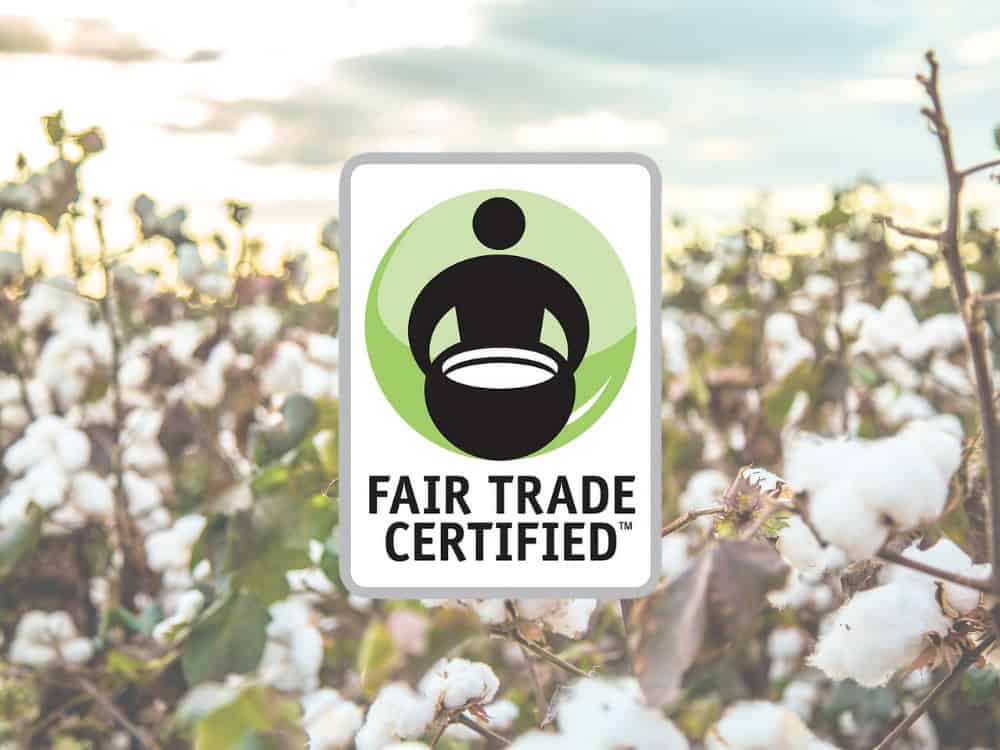
What Is Fair Trade?
The Fairtrade ethical label is alive and well. Despite rising food costs, 56% of shoppers are willing to pay more for fair trade products.
If you’re a regular reader, you’ll know we seek out fair trade products when shopping for everything from clothing to jewelry. But what is fair trade, exactly, and are the certifications reliable?
There’s a lot to unpack regarding fair trade—both good and not-so-good. So make yourself a cup of fair trade coffee, and let’s dive in.
The Full List Of Fair Trade Benefits & Considerations
- What does fair trade mean?
- Why is fair trade important?
- What are the criticisms of fair trade?
- The future of fair trade
- Should we support brands that don’t have a certification?
- Which brands are Fair Trade certified?
1. What Does Fair Trade Mean?
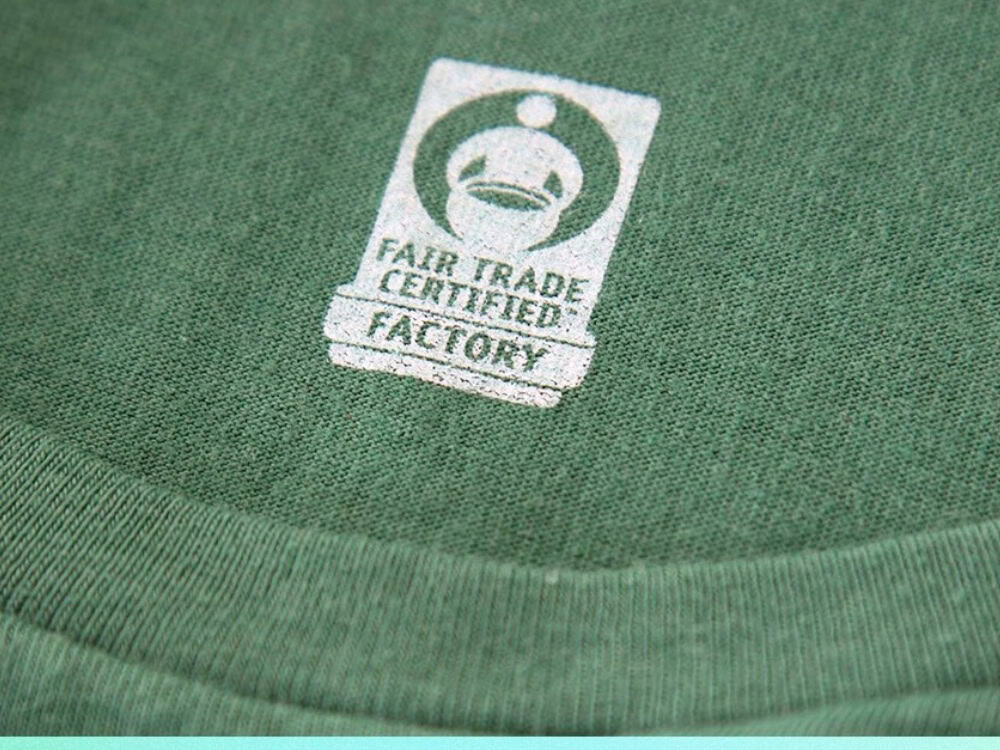
In a (fairly traded) nutshell, fair trade is a way of doing business more fairly. The Cambridge Dictionary’s definition of fair trade is: “a way of buying and selling products that makes certain that the people who produce the goods receive a fair price”.
For the most part, it means—at a minimum—better wages and working conditions for farmers and producers.
However, as conscious consumers, we know it’s important to be on the lookout for greenwashing. How do you know if farmers were properly compensated for that bar of ethical chocolate or if that fair trade rug you’ve had your eye on has fair trade ethics woven in?
Certifications can certainly help and here are the major players that certify that products have been fairly traded:
- World Fair Trade Organization (WTFO): A global membership organization active in 84 countries with a Guarantee System to verify only truly Fair Trade businesses. To become a Guaranteed WFTO member, an organization must fully practice its 10 Fair Trade principles.
- Fairtrade International: A global non-profit supporting over 2 million farmers and workers in 72 countries by providing a Fairtrade minimum price and a Fairtrade Premium (additional funds that go back to the community to use for projects of their choice). It owns the FAIRTRADE Mark, the most well-known fair trade label that verifies products according to the social, environmental, and economic Fairtrade Standards.
- Fairtrade America: The U.S. branch of Fairtrade International. This is the certification used by brands like Ben & Jerry’s and Divine.
- Fairtrade Australia New Zealand: The Fairtrade International branch in Australia/New Zealand certifies products for retailers like Aldi and PaknSave.
- The Fairtrade Foundation: Fairtrade International’s UK brand. Responsible for 4,500 products, their logo is on everything from vodka and ice cream to gold and footballs.
- FLOCERT: The global certifier for Fairtrade International and one of the strictest. They scour supply chains to look for fair practices and sustainability.
- Fair Trade USA™: North America’s top certifier of fair trade products has a different (but still very recognizable) logo. Fair Trade Certified™ means the improvement of millions of lives in 63 countries. Find the seal on food, clothing, home goods, and health and beauty products.
- Fair Trade Federation: A non-profit trade association of fair trade enterprises committed to trading partnerships that are sustainable and equitable. Dating back to the late 1970s, this organization helped expand markets for farmers and makers around the globe.
- Fair for Life: A certification program for “responsible supply chains” that support fair pricing, sustainable practices, biodiversity, and fair working conditions. It covers more than 700 companies and impacts 235,000 producers.
2. Why Is Fair Trade Important?
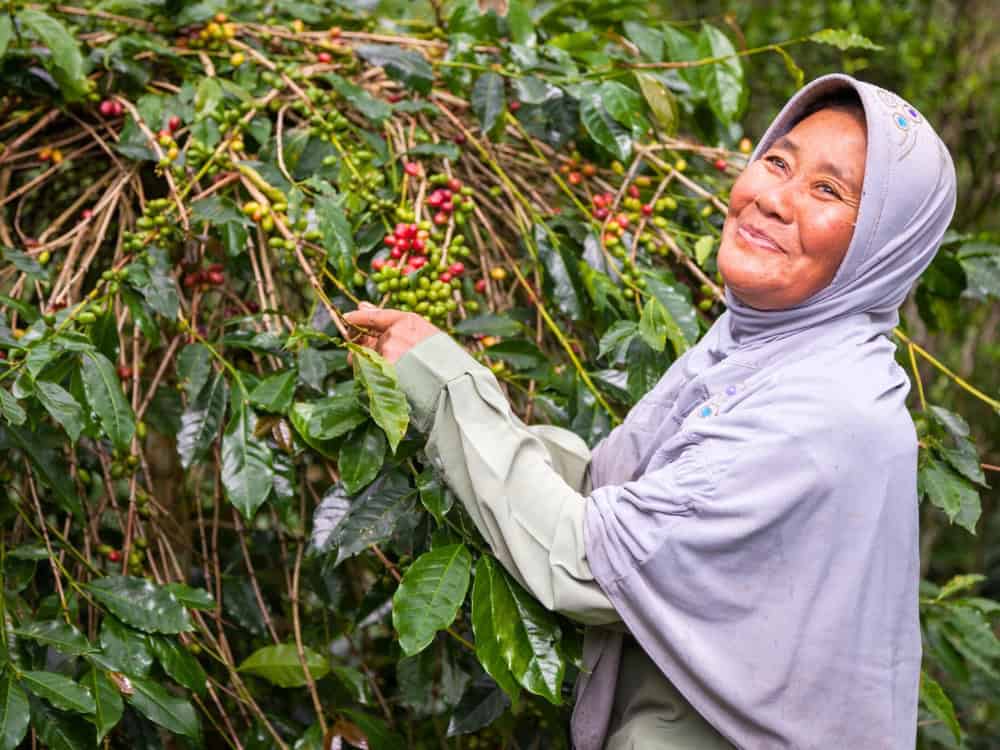
The benefits of fair trade are many. According to Fairtrade International: “Fairtrade changes the way trade works through better prices, decent working conditions and a fairer deal for farmers and workers in developing countries.”
It often starts with support for farmers and producers in developing countries, but it also benefits those at the other end of the supply chain by providing consumers with education and assurance that their purchases are making a difference.
Social Benefits Of Certified Fair Trade Products
To start, farmers and producers in developing countries receive fair prices or better wages.
In the case of farmers, minimum prices are established to cover the cost of a crop, even when market prices fluctuate. If there’s a drop in market price for a commodity crop, the farmer will still make enough to cover their basic costs. Above that, there are Fairtrade Premium or Community Development Funds—additional sums of money managed by the producers themselves that are allocated to support local projects that enhance access to health care, childcare, cultural celebrations, investments, education, and clean water, to name just a few.
Regarding working conditions, fair trade products are automatically free from supply chains associated with discrimination, child labor, forced labor, and forced overtime.
Across all supply chain entities, the fair trade system empowers workers, farmers, and producers to organize and participate in training and educational opportunities, while providing them with new market opportunities.
Environmental Benefits Of Certified Fair Trade Products
With fair trade, our planet wins, too. Fairtrade certification requires farmers to improve their soil and water quality and manage waste and pests in an ecologically sound manner.
It also prohibits some harmful chemicals (dangerous for workers) and requires that producers take steps to protect biodiversity and reduce GHG emissions.
Fairtrade Standards mean that products are never made with GMOs, and many are certified organic. Additionally, technical support in the form of training and education is provided so producers are more aware of their impact on the planet. Fair Trade USA, for example, incentivizes organic farming through training and higher prices for organic goods. The Fair Trade USA label is also only granted to those who comply with standards regarding carbon emissions, soil and water, biodiversity, waste, and agrochemicals.
Ultimately, sustainability is dependent on social, economic, and environmental factors. The biggest benefit of fair trade, as demonstrated by Fairtrade International in this video, is the ability of the movement to satisfy all three.
3. What Are The Criticisms Of Fair Trade?
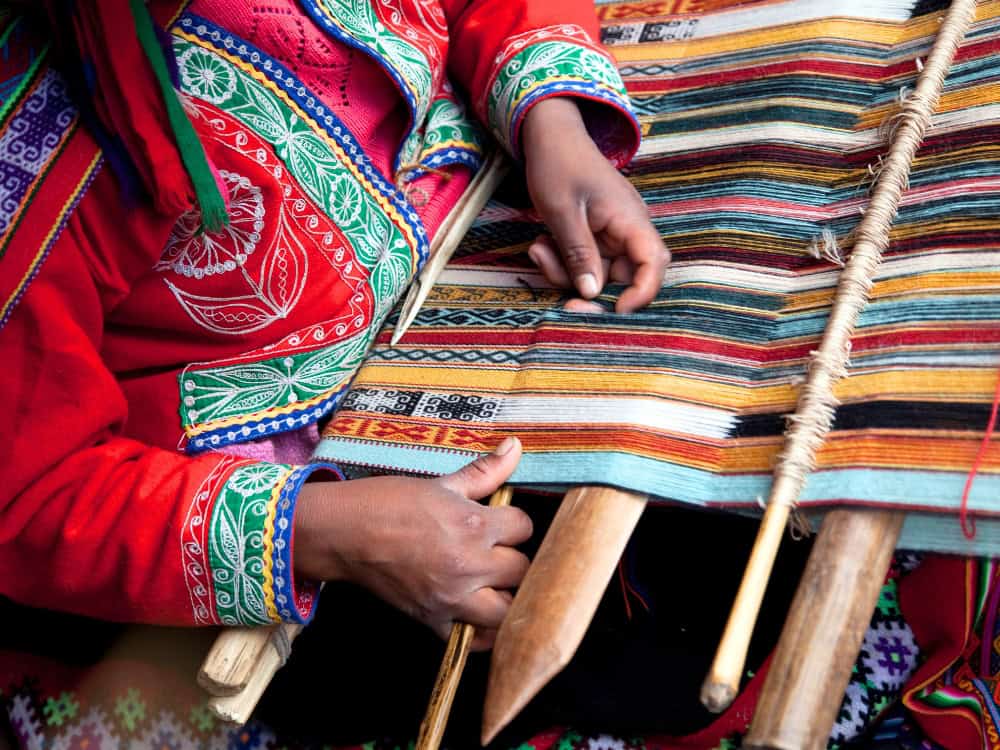
In most cases, fair trade does much more than provide farmers and producers with a fair price. But in some cases, it doesn’t even satisfy that. Much of this is due to the fact that “fair trade” may not be as universal as we may believe.
Other fair trade failures are due to some of the criteria and authenticity of the certifications themselves. Certifications help provide consumers with peace of mind—but there’s certainly still room for exploitation. One of the main criticisms of the fair trade movement is that it certifies many companies that simply aren’t ethical.
Questionable “Fair Trade” Companies
Doesn’t it seem slightly out of character for some megacorporations to hop aboard the fair trade chain?
Many experts think so. Some have dubbed certain certification schemes and companies as “fairtrade-lite,” drawing attention to the fact that some labels allow companies to sell products made with just a portion of fair trade products but still bear the logo.
Referring to the rise of in-house certification schemes, a Guardian article suggests: “What we’re looking at, in short, is something like a corporate capture of fair trade.”
Unfair Pricing
There’s a fine line between competitive prices that get fair trade products into the market and premium prices that genuinely support the movement’s aim to reduce poverty (but aren’t attractive enough for consumers).
Take, for instance, coffee or cocoa. If what’s produced can’t be sold, not all of it can be supported with fair trade’s minimum price. Instead, it receives a lower price leading fair-minded consumers to wonder if fair trade is even worth it.
While farmers and producers are paid wages to provide them with a safety net that can reduce the impacts of global market price drops, it’s wrong to assume they’re getting living wages. In many cases, they’re not.
Fair For Workers?
Then there are the working conditions to attend to. In 2014, a damning report came out indicating that “Fairtrade has made no positive difference—relative to other forms of employment in the production of the same crops—to wage workers”.
For smaller producers, fair trade provides too many barriers to certification, including certification costs, administration fees, and requirements to be in a cooperative. Many truly ethical producers are excluded from the fair trade club simply for their size (and, more importantly, the size of their bank account).
Some non-fair trade producers are actually better supported than those with certification. As a 2018 Forbes article pointed out, craft-based work that takes place at home—mostly by women—isn’t often sought out by fair trade organizations, leaving around 300 million homeworkers out of potentially empowering fair trade partnerships.
However, the Fair World Project argues that “it does not mean that the fair trade model—conceived as a way to enhance opportunities and market access for small-scale farmers—is not working or should be abandoned.”
4. the future Of Fair Trade
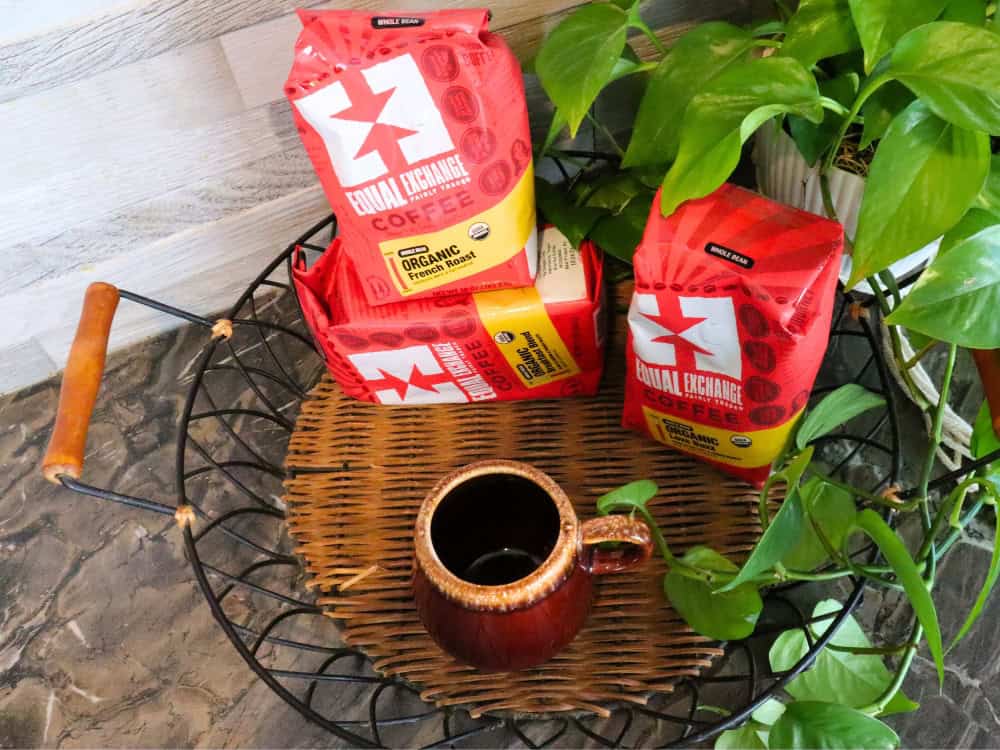
Despite its criticism, the fair trade movement is well-intended and has been a game-changer for many around the world. Tackling global inequality within rapidly changing markets is no mean feat. Supporting fair trade means supporting the evolution of organizations and systems that are better for workers around the globe.
In other words, fair trade has a major role to play in the development of more sustainable business practices. Some recent developments from Fairtrade International alone include:
- A new sustainable agricultural policy to support the transition to agroecology and regenerative farming systems.
- An updated Coffee Standard to tackle deforestation by supporting producers in developing prevention and mitigation plans and carrying out monitoring.
- Continued progress towards living wages for all through establishing country-specific benchmarks, strengthening standards (including base-wage requirements), and the Fairtrade Premium.
- A base wage for banana workers set at 70% of the take-home pay needed for a living wage. A 2023 recent report details how the Fairtrade Premium is making an important difference to the lives of banana workers in Ghana and Columbia.
5. Should We Support Brands That Don’t Hold A Fair Trade Certification?

Since being “fair trade certified” doesn’t pull the weight it once did, some brands are opting to invest the funds they could spend on certification on other means of improving and monitoring their supply chain. In some cases—such as when brands forge direct, long-term relationships with their suppliers—this provides consumers with a more transparent account of how their favorite ethical clothing brands and foodstuffs have been produced.
However, if a brand lacks certifications, it can be much more difficult to discern if it is truly ethical. Without that convenient little logo signifying third-party audits and regular (typically annual) re-certifications, how do you know if a brand’s claims of fair trade equivalent practices are legitimate? Should we avoid brands that aren’t certified?
Not at all! For some companies, certification simply doesn’t make sense. Some online ethical marketplaces have developed their own schemes to reach a larger group of artisans. These can sometimes do better than fair trade to support independent workers in global communities. They may even be superior in ensuring living wages too.
For example, when it comes to specialty coffee, not all sustainable coffee brands are Fairtrade certified but pay above fair trade prices for high-quality coffee.
But, because everyone and anyone can add the words “fair trade” to a product description or label, you’ll have to put in a little work beyond looking for a logo. Examine a brand’s website and blog for transparent supply chain details. If not, quiz a brand on how workers are supported.
Brands like Veja explain in detail how they source their fair trade rubber and cotton and how their pre-financing of harvests and setting of “market-decorrelated prices” lead to secure livelihoods.
6. Which Brands Are Fair Trade Certified?

If you still feel more comfortable sticking with truly certified fair trade brands, here’s some of our favorites:
- Partnering with Fair Trade USA, Patagonia has supported the fair trade movement since 2014. More than 75,000 workers worldwide are supported by 85% of their line being fair trade certified.
- Certified B Corp Dr. Bronner partners with Fairtrade producers when sourcing ingredients, such as cocoa, coconut oil, and olive oil for range of all-in-one non-toxic cleaning products. In addition to fair trade premiums, they’ve supported producer communities with an extra $220,000.
- For sustainable blankets, bedding, towels, and home decor, brands like Coyuchi and The Citizenry offer products that are Fair Trade certified, meaning fair wages and ethical practices are guaranteed.
- To help you discover fair trade brands, multi-brand marketplaces such as Made Trade and EarthHero have an option to filter search results based on your values.
Did you know we Have a Newsletter?
We cover the latest in sustainable living, fashion, zero waste, beauty, travel, finance and more…
Pin these:





